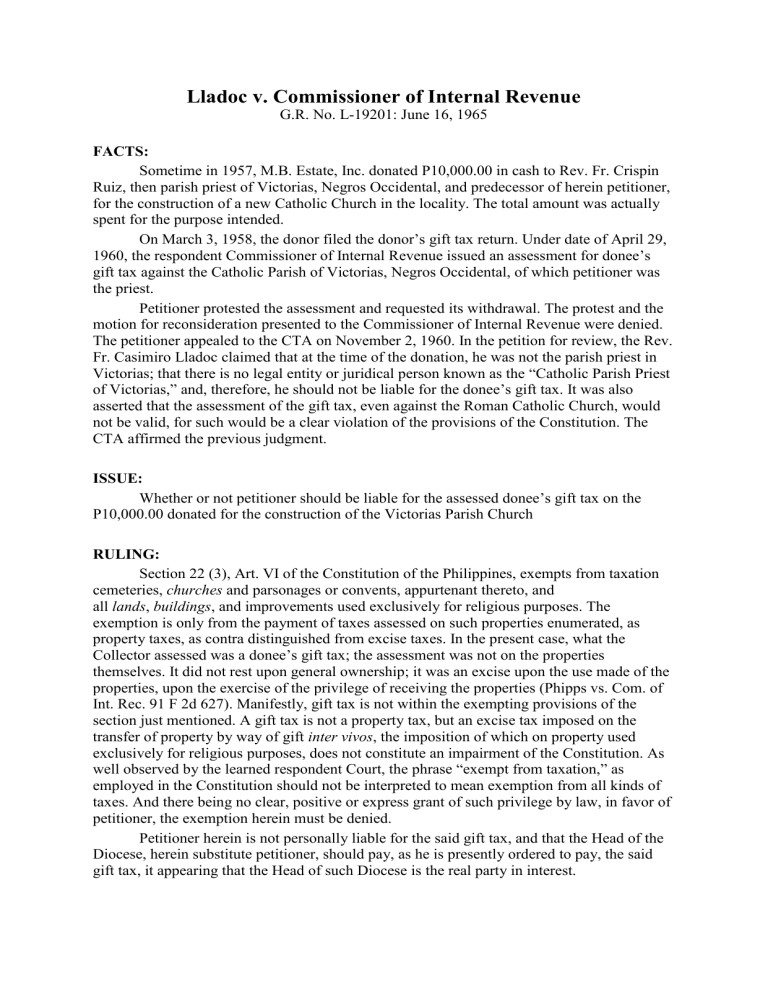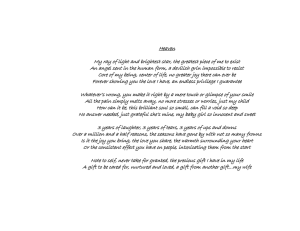
Lladoc v. Commissioner of Internal Revenue G.R. No. L-19201: June 16, 1965 FACTS: Sometime in 1957, M.B. Estate, Inc. donated P10,000.00 in cash to Rev. Fr. Crispin Ruiz, then parish priest of Victorias, Negros Occidental, and predecessor of herein petitioner, for the construction of a new Catholic Church in the locality. The total amount was actually spent for the purpose intended. On March 3, 1958, the donor filed the donor’s gift tax return. Under date of April 29, 1960, the respondent Commissioner of Internal Revenue issued an assessment for donee’s gift tax against the Catholic Parish of Victorias, Negros Occidental, of which petitioner was the priest. Petitioner protested the assessment and requested its withdrawal. The protest and the motion for reconsideration presented to the Commissioner of Internal Revenue were denied. The petitioner appealed to the CTA on November 2, 1960. In the petition for review, the Rev. Fr. Casimiro Lladoc claimed that at the time of the donation, he was not the parish priest in Victorias; that there is no legal entity or juridical person known as the “Catholic Parish Priest of Victorias,” and, therefore, he should not be liable for the donee’s gift tax. It was also asserted that the assessment of the gift tax, even against the Roman Catholic Church, would not be valid, for such would be a clear violation of the provisions of the Constitution. The CTA affirmed the previous judgment. ISSUE: Whether or not petitioner should be liable for the assessed donee’s gift tax on the P10,000.00 donated for the construction of the Victorias Parish Church RULING: Section 22 (3), Art. VI of the Constitution of the Philippines, exempts from taxation cemeteries, churches and parsonages or convents, appurtenant thereto, and all lands, buildings, and improvements used exclusively for religious purposes. The exemption is only from the payment of taxes assessed on such properties enumerated, as property taxes, as contra distinguished from excise taxes. In the present case, what the Collector assessed was a donee’s gift tax; the assessment was not on the properties themselves. It did not rest upon general ownership; it was an excise upon the use made of the properties, upon the exercise of the privilege of receiving the properties (Phipps vs. Com. of Int. Rec. 91 F 2d 627). Manifestly, gift tax is not within the exempting provisions of the section just mentioned. A gift tax is not a property tax, but an excise tax imposed on the transfer of property by way of gift inter vivos, the imposition of which on property used exclusively for religious purposes, does not constitute an impairment of the Constitution. As well observed by the learned respondent Court, the phrase “exempt from taxation,” as employed in the Constitution should not be interpreted to mean exemption from all kinds of taxes. And there being no clear, positive or express grant of such privilege by law, in favor of petitioner, the exemption herein must be denied. Petitioner herein is not personally liable for the said gift tax, and that the Head of the Diocese, herein substitute petitioner, should pay, as he is presently ordered to pay, the said gift tax, it appearing that the Head of such Diocese is the real party in interest.




